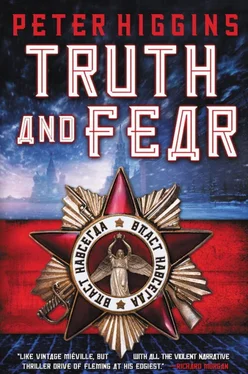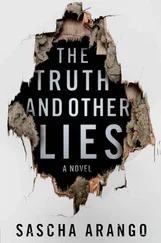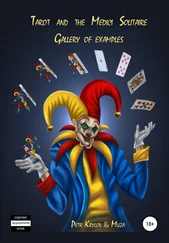Sailors discharged from the navy sometimes took work on the river mail, and so did disillusioned politicals: zeks who had survived a sentence in the hard camps. It was something you could do, if you had no place to go. If you’d never had a home. Or you had lost it. It was something Lom had once thought he might end up doing himself, one day. But he didn’t want to be alone. Not always. Not for ever.
Past the postal depot, they turned away from the canal into the Bronze Sturgeon Quarter. There was not enough traffic in the road. Lom didn’t like it. He felt exposed: him in his mud-streaked cloak-like loden, Maroussia bare-legged and shivering in her thin summer coat, they were too visible .
‘Isn’t there another way we could go?’ he said. ‘We stick out a mile.’
Maroussia shook her head.
‘Not without crossing the Lilac Bridge, and they always check papers there. We’ll be in Starimost soon. It’ll be better there.’
As they approached Starimost the buildings got bigger and grander, the roads more crowded: trams, horse-drawn karetas, the occasional private automobile. The street they were following widened and became a Prospect. Houses gave way to shops, department stores and hotels. Yellow light glowed in the windows and made soft halo-edges in the cold fog, as if it was later than it was. There were no checkpoints here, and no traces of the floods any more. Good property in Mirgorod was above the high-water line.
Maroussia stopped at a milliner’s window. ‘Look,’ she said. ‘Look at this.’
Lom came and stood next to her. Her cheeks were pink with cold, her short black hair, slicked damp and glossy from the fog, lay in tight curls across her forehead and stuck to the back of her neck. The window display was swathed with elegant lengths of mourning cloth. Among the homburgs, fedoras and astrakhans, the fascinators, cloches and cocktail hats, was a photograph of the Novozhd framed in overwrought gilt and draped with ribbons of black silk.
‘He must be dead,’ she said. ‘The Novozhd is dead. It doesn’t seem possible. Maybe it’s something else. His wife, or…’
But other shops carried similar displays. Businesses had closed their doors in grief and left black-edged handwritten cards in their doors: ‘ The proprietors and staff of Blue’s Tea Importation Company weep together for our beloved Novozhd .’ They had to step off the pavement to avoid the small crowd that had gathered round a stall selling mourning flags and tokens of remembrance. The stuff was hastily made and shoddy. Brass medal-pins. Red and black silk lapel-flowers. Lettered jugs and teapots. Black-rimmed cake plates with the Novozhd’s profile in the centre, his face looking strangely pink. Lom stopped at a newspaper kiosk to read the headlines. The front pages shouted in heavy black capitals, PEOPLE OF MIRGOROD, LINE THE STREETS WITH MOURNING BLACK! JOY FOR HIS LIFE! SORROW FOR HIS DEATH! HATRED FOR HIS KILLERS! MORE IS REQUIRED OF US NOW! RALLY TO THE STANDARD OF THE COLLOQUIUM! The funeral was to be held that afternoon. That explained the police lockdown in the centre of the city. Lom picked up a paper and read the front page.
‘He didn’t just die,’ said Lom; ‘he was killed. Assassinated. A bomb.’
‘Then everything is changed,’ said Maroussia. ‘Nothing will be the same now.’
Lom realised she was right. For twenty years–more–the Novozhd’s face, familiar, benevolent, paternal and determined, had looked out on the Vlast, smiling or stern, from posters, newspapers, cinema screens, history books, the wall of every office and school and home. Every person in the Vlast read about him, thought about him, dreamed of him all the time. The Novozhd was everyone’s constant interior conscience and companion, the interlocutor of a thousand imagined conversations, confessions and tirades. Even if you despised him he was always there . Even his enemies needed him, to give their enmity shape and meaning. And now he was gone. Something permanent had shifted, something unthought-of had come into the world. A wall had fallen down, a door had opened. A gap.
‘What’s the Colloquium?’ said Lom. ‘You heard of it before?’
Maroussia shrugged.
‘Somebody new will take over now,’ she said.
‘There’ll be trouble first,’ said Lom. ‘This will stir things up.’
Half an hour later, they were standing side by side outside the Hotel-Pension Koromantsy Most in Marzelia Vovlovskaya Prospect. An expensive place. Plate-glass windows. OYSTERS. FRUITS DE MER. The temperature was still falling. A brisk gusting wind from the north-west straight off the Cetic Ocean had scattered the fog. It sliced through their clothes and threw scant handfuls of snow in their faces. Sharp flakes caught on their shoulders and sleeves. In Maroussia’s hair. They watched the moneyed classes of Mirgorod taking early luncheon. Warm white light, white table linen, white napkins. MINERAL-VODA. SOURCE VAKUL. Fat men of business at their coquilles and perch. Hard, watery eyes blinked through flashing lenses. Women in furs and red shoes drank chocolate and ate cakes with pursed, dissatisfied lips. A clatter of lipstick and pastry crumbs, flickering tongues, complaints. The restaurant door opened and a sullen group pushed past them out into the street. Lom caught the smell of the dining room on their clothes. Garlic and gravy and eau de toilette. They’d left an unopened eighth of cherry aquavit on their table. RANEVSKAYA’S ORCHARD.
Lom was using the plate-glass window as a mirror. He caught a glimpse of something thirty yards back. Maybe. Too far for details. When he turned round to look there was nothing. But the edgy feeling was back, the pressure at the top of his spine, the certainty that he was being watched.
Josef Kantor, master terrorist, was alone in his room on the Ring Wharf, listening to the voice of Marfa-Anna Priugachina. She was singing the ‘Apple Harvest’ from Lefalla’s Five Evening Songs.
The autumn orchard drowsing
In the honey-warm windfall sun.
The phonograph, a portable ODZ Pobedityel, was a new acquisition. When it was closed, the heavy, rexine-covered wooden cabinet looked like a briefcase, and when you unlatched and lifted the lid to reveal the turntable with its mat of red felt, it released a rich unnameable scent of components and dust. The neat iron crank handle was clipped inside the lid. All it needed was a disc on the felt, a few turns of the crank in the slot on the side of the box, and the machine was ready. A neat, precise lever dropped the meticulously balanced tone-arm into position and Lefalla’s melody, coming rich and full from the perforated grille on the sides of the casing, filled the room. The gramophone was modernity in a box. The contrast between the precision of its components and the nostalgic melancholy confection of Priugachina’s voice stimulated and soothed him.
One sweet last fruit for Ninel
Before the salt stars come.
Kantor had treated himself to the phonograph the week before: one small gift to himself, one negligible handful of roubles skimmed from the thirty million before they went north to Yakov Khyrbysk. It was a rare departure from his iron principle that all money was for the cause and none for himself, except the most frugal of necessary living expenses. But the deviation from his own discipline didn’t trouble him. It was justified. Looked at clearly, it was no deviation at all. The spirit must be nourished, just as much as the body must, because Kantor was a poet: his greatest resource was the force of imagination, and imagination must be given space to stretch and breathe, or else it grew tired and constrained, and then he missed opportunities and made mistakes.
Читать дальше


![Кэмерон Доки - Правда и ее последствия[Truth and Consequences]](/books/79610/kemeron-doki-pravda-i-ee-posledstviya-truth-and-con-thumb.webp)









